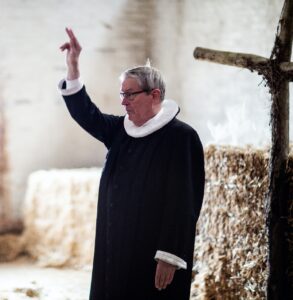
Confession and Absolution
 The first time I ever prayed any version of our Confession from the Book of Common Prayer was during my first year of seminary. I was thirty-three years old, had believed in Jesus for as long as I could remember, had been baptized at fifteen, and I had confessed my sins to God and others many times. However, I had never prayed, or even heard of, the BCP’s prayer of Confession. The simple BCP Confession deeply moved me those first few times I prayed it, and it still does today.
The first time I ever prayed any version of our Confession from the Book of Common Prayer was during my first year of seminary. I was thirty-three years old, had believed in Jesus for as long as I could remember, had been baptized at fifteen, and I had confessed my sins to God and others many times. However, I had never prayed, or even heard of, the BCP’s prayer of Confession. The simple BCP Confession deeply moved me those first few times I prayed it, and it still does today.
The Confession gives us a true prayer that we can always pray together or alone. It begins by beautifully addressing our God who is “most merciful.” What a comfort to come to the one who loves us, desires for us to confess, and who is abounding in steadfast love and mercy! Against him, all we who have received the indwelling gift of the Holy Spirit, understand that we far too often continue to sin in “thought, word, and deed, by what we have done, and by what we have left undone.” Before I learned the BCP confession, I asked for forgiveness much less often for the things I had left undone. Why? I simply didn’t think about them, because they were left undone. The BCP Confession also helps us remember our need for mercy and forgiveness for these undone deeds.
The perfect Law of God is summarized in both the Old Testament (Deut 6:4-5; Lev 19:18) and the New Testament (Mark 12:29-31) as, “love the Lord your God with all your heart and with all your soul and with all your mind and with all your strength…. love your neighbor as yourself.” How beautiful and simple! Yet we know how quickly and easily we fail to love God and our neighbors perfectly. Therefore we continue our confession by admitting to our Merciful God that “we have not loved you with our whole heart; we have not loved our neighbors as ourselves.”
Because of our many sins that we confess during this prayer of Confession, we continue to confess that, “We are truly sorry and we humbly repent.” We then continue placing our trust in Jesus Christ. It is for Jesus’ sake that we can know our merciful God is “faithful and just to forgive us our sins and to cleanse us from all unrighteousness (1 John 1:9).” Believing that we are forgiven through Jesus moves our hearts to “delight in God’s will, and walk in his ways, to the glory of his name.”
 Yet we are also very familiar with the cry, “I believe; Help my unbelief (Mark 9:24!) Here the Absolution provides even more assurance and another reminder of our merciful God’s “promised forgiveness of sins to all those who sincerely repent and with true faith turn to him.” The celebrating priest is entrusted with this solemn duty of reminding and assuring us, through an audible human voice, that our merciful God truly promises us pardon and deliverance from sins, strengthening in goodness, and that he will bring us to everlasting life, through Jesus Christ our Lord. 2 Corinthians 1:20 assures us that, “All the promises of God find their Yes in [Jesus]. That is why it is through him that we utter our Amen to God for his glory.”
Yet we are also very familiar with the cry, “I believe; Help my unbelief (Mark 9:24!) Here the Absolution provides even more assurance and another reminder of our merciful God’s “promised forgiveness of sins to all those who sincerely repent and with true faith turn to him.” The celebrating priest is entrusted with this solemn duty of reminding and assuring us, through an audible human voice, that our merciful God truly promises us pardon and deliverance from sins, strengthening in goodness, and that he will bring us to everlasting life, through Jesus Christ our Lord. 2 Corinthians 1:20 assures us that, “All the promises of God find their Yes in [Jesus]. That is why it is through him that we utter our Amen to God for his glory.”
Fr. John
